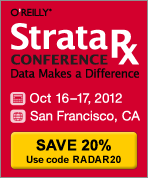Ann Waldo, a partner in Wittie, Letsche & Waldo, LLP in Washington, DC, presents a summary of her work in the webcast “Overview of Privacy Concerns and Regulatory Challenges Concerning Personalized Medicine — and Some Modest Suggestions for Change.” This was part of the Strata Rx Online Conference: Personalized Medicine, a preview of O’Reilly’s conference Strata Rx, highlighting the use of data in medical research and delivery.
Waldo highlighted how HIPAA regulations and other laws passed by federal and state governments contain restrictions that make research with patient data unnecessarily difficult. She offers several suggestions for reform.
Key points from her presentation include:
- Privacy is always balanced against data’s usefulness, and the appropriate level of protection differs between observers. Some of the ways risks vary: more specific genomic tests involve more risk of revealing the individual than less specific tests. Storing the data for a long time increases the risk of patient identification. [Segment begins at the 1:08 mark.]
- What should patients be told about research on their personal data? Their questions should be answered, which isn’t always done today. But if additional information turns up in the research, it’s unclear whether it should be communicated to the patient. This is a “raging controversy in bioethics,” and courts have ruled on both sides of the question, so the researchers face risks no matter which course they choose. [6:09]
- It’s not clear whether a researcher should remove genetic information at the request of a patient, given that discrimination can occur. Current law does not allow removal of accurate information. [7:50]
- The HITECH law of 2009 prohibits the sale of personally identifiable health information (PHI) There is a very narrow exception for research, which is unrealistic and does not reflect the costs of negotiating and setting up the transmission of data. (Data de-identified according to HIPAA standards is not PHI.) [20:55]
- People get “consent exhaustion,” where they fail to understand the ramifications of research and arbitrarily stop signing forms at some point. [27:07]
- HIPAA prohibits the use of data for future research that is not immediately specified. Many people with serious and terminal illnesses would like their data to be used in unspecified research, which is currently banned. [28:36]
Waldo’s suggestions include [her “where do we go from here” segment begins at 29:58]:
- Exempting research from the ban on the sale of PHI.
- Allowing related types of studies without further consent.
- Allowing data to be used for optional parts of a study without further consent.
- Allowing people to sign general consent to use data for future research.
Waldo’s full session is embedded below:
 Strata Rx — Strata Rx, being held Oct. 16-17 in San Francisco, is the first conference to bring data science to the urgent issues confronting healthcare.
Strata Rx — Strata Rx, being held Oct. 16-17 in San Francisco, is the first conference to bring data science to the urgent issues confronting healthcare.
Related:
